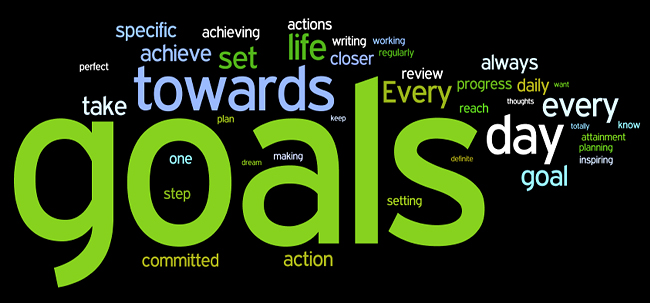Setting goals and sticking to them is easier said than done, but we found proven ways to help you set goals and stick to them. Let’s go!

Photo Credit: Unsplash/Danielle MacInnes
At the beginning of each year, goal setting becomes a trending topic. However, we think goal setting should be trending all year. We all have dreams, but when they get transferred into goals, we take serious action and start getting close to them. What rad goal do you have? Is it getting physically stronger? Learning how to play an instrument or speak a language? Acing your exams? Starting a career of your dreams? Whatever it is, we have tips to help you organize.
Science Behind Goal Setting – Locke & Latham

Researcher Edwin A. Locke made goal setting hot in the 20th century! In 1968, Mr. Locke was a pioneer of goal-setting theory. Gary P. Latham joined Locke in further developing a goal-setting theory, which resulted in a published book A Theory Of Goal Setting & Task Performance in 1991. As a result of their collaboration, a goal-setting theory came together with five key principles. These were used for increasing the productivity of workers in companies, but it’s equally effective for all of us trying to achieve something on our own. The principles (presented with our little twist) are:
- Specificity – the more general we are with our goals, the more casually we will approach them. The more specific we get, the higher the probability of taking serious action.
- Difficulty – When someone advises you to “start small,“ take that advice with a grain of salt. It doesn’t mean that one should set a discouraging goal, but a little challenge is essential to work harder.
- Commitment – This is where things get tricky for all. While setting a goal is the easier part, commitment to achieving it is what most struggle with. The level of commitment depends on who sets the goal – is it your boss at the workplace or is it you, at home? Also, how excited does the goal make you? This makes a world of difference in your performance.
- Task Complexity – If you want to achieve a specific weekly goal, you should set daily goals, or even hourly goals. Breaking down a complex goal into “digestible“ pieces is a winner’s tactic.
- Feedback – When you work to reach your goal, you need to know how you’re progressing. The best motivation is seeing how far you’ve come compared to day one. Therefore, consistent feedback is needed to not only track progress, but also make adjustments in tasks. Also, congratulate yourself. Celebrate your victories!

Taking your goals and achieving them one step at a time can feel daunting, but once you start taking those steps a little quicker with each new goal, you’ll find that the process begins to even out even as the goals become a little more difficult from time to time.
WTR?

There’s one thing that I’d like you to take from an article like this, and that’s the fact that we here at Radass want our readers to achieve their goals, follow their dreams, and excel at whatever it is they want to do. Go out and make your dreams into a reality Radasser’s!








